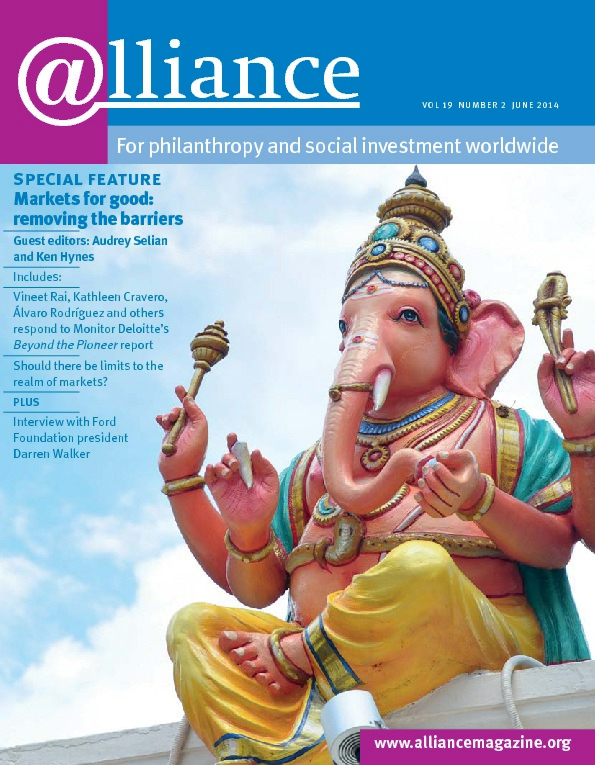The recently published Monitor Deloitte report Beyond the Pioneer: Scaling new industries to benefit the poor[1] offers great insight into the challenges, opportunities and lessons learned from an impact investing perspective. Although it focuses on companies that offer goods and services to populations at the base of the pyramid in emerging markets, many parallels can be made with the challenges faced by companies and industries in developed markets. The similarities lie more specifically on the business development side, the differences in the geopolitical frameworks.
As strongly underlined by the report, scaling industries is key to solving many of the issues facing poor populations in emerging markets. Although social issues in wealthier geographies are quite different in nature, the challenges that companies face in providing products and services that can sustainably solve core issues are very similar.
Before elaborating on the parallels between developing and developed markets,
it is worth noting that the report fails to mention environmental risks and focuses only on social issues. Poverty alleviation in emerging countries has indeed been the focus for most impact investors, but impact investing can and should be applied globally and with equal focus on the social and environmental stakes. The interdependence of the two is great, so much so that efforts to solve one issue can be successful only if the other is solved as well. A positive and lasting impact in the fight against poverty cannot be achieved without addressing environmental issues which affect health, agriculture, demographics and biodiversity in general. Equally, land and air pollution, the acidification of oceans or the depletion of natural resources can be tackled only if social characteristics, which are often at the root of some of these forms of ecological damage, are looked at. (Photo by Shinobu Sugiyama).
In my experience as an impact investor, the main challenges facing companies whose products and services have a positive impact on society and the environment are fourfold:
1 Appropriate management skills to scale the company
2 Sufficient finance to enable scaling up
3 Sufficient demand for a specific product or service
4 An appropriate regulatory framework to enable the industry as a whole to scale
The first two of these relate to the scaling of individual enterprises, which is the main focus of an earlier Monitor report, From Blueprint to Scale: The case for philanthropy in impact investing. The second two relate more to scaling at the ecosystem level, the subject of the new report. Enterprise success, and thus impact success, is really dependent on all of them.
1 Appropriate management skills to scale the company
Enterprise success is essential for the sustainable delivery of positive products and services. Lack of appropriate management skills is probably the single greatest reason for enterprise failure. It is a greater issue in developing markets where there is a shortage of management know-how. Enterprises are started by well-meaning individuals who have successfully developed a product or service but are unable to manage inevitable enterprise growing pains (cashflow deficiencies, hiring relevant human resources, IT integration, logistics and supply chain management, etc). Although scaling a company is more difficult in developed markets because of greater competition and slower market growth, management skills are largely in line with the challenges at hand.
2 Sufficient finance to enable scaling up
Next is the ever-present issue of finance. Although companies in traditional markets in the developed world have, most of the time, easy and plentiful access to investment capital, companies focusing on core social and environmental orientated markets, products and services find it just as difficult to access capital as those in developing markets. We can see the statistics of the impact investing market. The numbers are comparatively small. Even when financing is available, the challenge for management is to ensure that the investors are well aligned with the company’s key social and environmental development objectives. No small task. In impact investing, it is more about how we invest than where we invest; unknowledgeable and unsophisticated capital can be disruptive.
3 Sufficient demand for a specific product or service
Beyond the Pioneer talks about ‘pushing’ products and services in order to generate the desired positive impact, or turning needs into consumer demand. The challenge is for companies to turn those needs into demand which will then create revenue. Needs in developing markets have been well documented and well researched; however, they are not really met. Companies and industries in emerging markets thus have an easier task in providing the products and services needed by a large number of people. On the other hand, need is no longer a term associated with developed markets. We have everything we need for our basic well-being. As such, new products and services need to create demand at a much greater level than in emerging markets, even those deemed to have a positive social and environmental impact. Take the renewable energy market as an example.
4 An appropriate regulatory framework to enable the industry as a whole to scale
Poor regulatory frameworks in developing markets (few tax incentives or prohibitive taxation, bureaucratic processes for enterprise creation, poorly enforced property rights and unclear title registration systems, etc) have, for a long time, been a hindrance in the proliferation of small and medium-sized enterprises, whereas in the northern hemisphere there have been many incentives and incubating measures to help SMEs develop. Thanks in part to great initiatives such as UNCTAD’s Eregulation, a business incentive programme, emerging market bureaucracy has diminished substantially and procedures have been greatly simplified and many barriers taken away. It is a paradox to note that as bureaucracy is brought down in developing markets, it is increasing substantially in developed markets. This is undoubtedly a threat to the viability of small businesses; only large companies will be able to hire hoards of accountants, compliance officers and lawyers to handle the myriad legal and tax risks.
In summary, challenges and opportunities are global. Investment capital is global as well. It really comes down to implementation and execution, which are dependent on very local processes. The Monitor Deloitte report could be simply retitled ‘Scaling New Industries to Benefit the Planet’.
1 Just before printing, the subtitle of the report was changed to ‘Getting inclusive industries to scale’. We have not changed it here because much of the point of this article hinges on the wording of the original version of the title.
Guillaume Taylor is managing director of Quadia. Email taylor@quadia.ch







Comments (0)